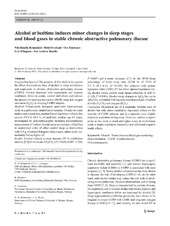| dc.description.abstract | Purpose/background: The purpose of this study is to explore the effect of a moderate dose of alcohol on sleep architecture and respiration in chronic obstructive pulmonary disease (COPD). Alcohol depresses both hypercapnic and hypoxic ventilatory drives in awake, normal individuals and reduces the amount of rapid eye movement (REM) sleep and oxygen saturation (SpO2) in sleeping COPD subjects. Methods: Prospectively designed, open-label interventional study in a pulmonary rehabilitation hospital. Twenty-six (nine males) stable inpatients, median forced expiratory volume first second (FEV1) 40.5 % of predicted, median age 65 years, investigated by polysomnography including transcutaneous measurement of carbon dioxide pressure increase (ΔPtcCO2) in randomized order of either control sleep or intervention with 0.5 g of ethanol/kilogram bodyweight, taken orally immediately before lights off. Results: Alcohol induced a mean increase (95 % confidence interval, [CI]) in the mean ΔPtcCO2 of 0.10 kPa (0.002–0.206, P = 0.047) and a mean decrease (CI) in the REM-sleep percentage of total sleep time (REM % of TST) of 3.1 % (0.2–6.0), (P = 0.020). Six subjects with apnea/hypopnea index (AHI) ≥15 had fewer apneas/hypopneas during alcohol versus control sleep (mean reduction of AHI 11 (1–20), P = 0.046). Alcohol-sleep changes in SpO2, but not in ΔPtcCO2, correlated with daytime arterial pressures of carbon dioxide (PaCO2) and oxygen (PaO2). Conclusion: Occasional use of a moderate, bedtime dose of alcohol has only minor respiratory depressant effects on the majority of COPD subjects, and in a minority even slightly improves respiration during sleep. However, caution is appropriate as this study is small and higher doses of alcohol may result in major respiratory depressive and additional negative health effects. | en_US |

